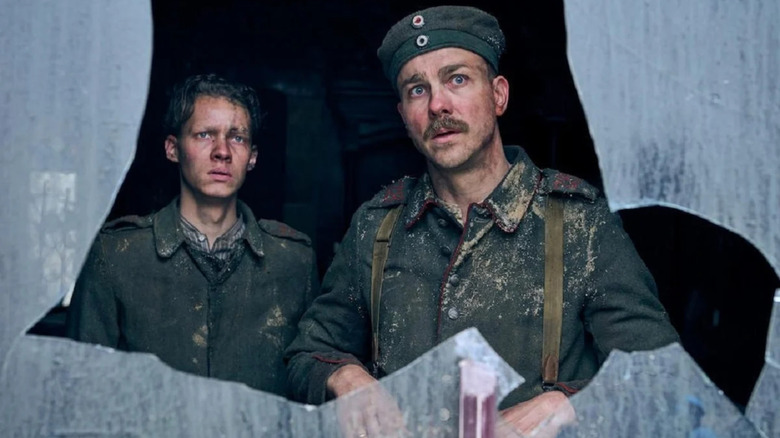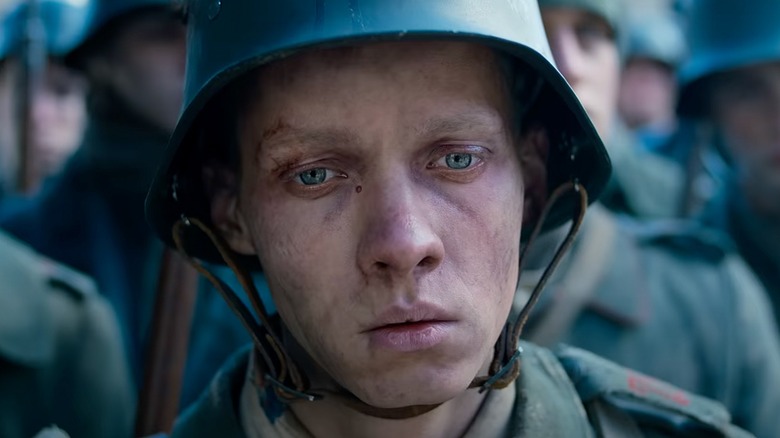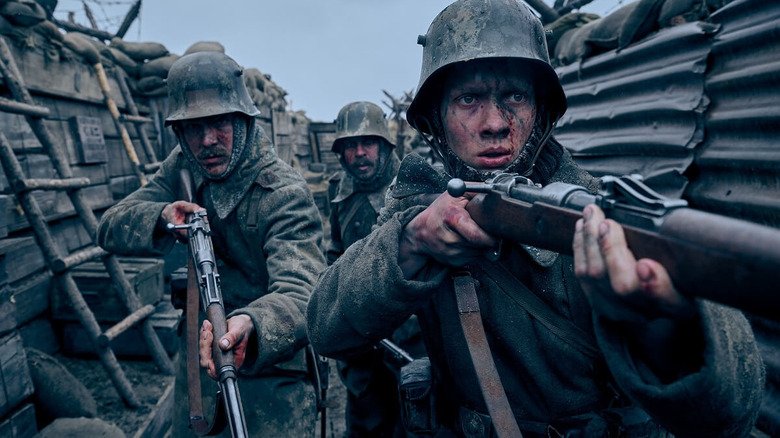All Quiet On The Western Front's Oscar-Nominated Screenplay Was Kept Alive By Triathlons
On Sunday, March 12, Edward Berger's film "All Quiet on the Western Front" won four Academy Awards: Best Original Score, Best Cinematography, Best International Feature, and Best Adapted Screenplay. In terms of Oscar records, it is only the fourth film in a language other than English to win that many awards (the previous three were "Fanny and Alexander," "Crouching Tiger, Hidden Dragon," and "Parasite"). Although based on a 1928 German novel by Erich Maria Remarque, it is the first filmed version of "All Quiet" that was made in Germany. The previous two iterations were made in America, with Lewis Milestone's astonishing 1930 adaptation having won Best Picture, and the Delbert Mann's 1979 TV movie being readily available on multiple streaming services.
Berger's version of was co-written by the director and Scottish screenwriter/competitive athlete Lesley Paterson, now the possessor of both an Academy Award and three gold medals from the XTERRA Triathlon World Championships. Oh, and she has also won two gold medals from the ITU Cross Triathlon World Championships and multiple other medals and trophies besides. She is the co-author of "The Brave Athlete: Calm the F*** Down and Rise to the Occasion," a 2017 motivational book for aspiring athletes. It also turns out that Paterson's athletic career is one of the main reasons that "All Quiet" finally got made.
In a recent interview with Empire, Paterson related her relationship to Remarque's novel, and it turns out that she had long been interested in making a new film version, going back to her time in school. But, as she explains, she had the adaptation rights for so long that she would have to periodically re-buy them when the contract lapsed. And what better way to re-buy book rights than winning cash prizes in triathlons?
The inspiration
In the Empire interview, Paterson recalled why she was drawn the novel in the first place, saying:
"It's such a beautifully poetic piece of writing. [...] The betrayal of a youthful generation resonated with me. I was young when I read it but I grew up in Scotland and that underdog, fighting-against-the-upper-echelons spirit is close to my heart."
The article describes an extensive process that Paterson went through to bring "All Quiet" to the big screen. Evidently, she bought the right to the novel back in 2006, and many of her attempts to bring it to producers fell through. Paterson even said that one of the film's potential producers went to prison for shady financial crimes. Various famous people were attached along the way — Daniel Radcliffe was seemingly interested once — while some producers actively rejected the idea. Paterson said that "One studio executive told me, 'I can't sell this. Give me a female John Wick!'" Perhaps not quite in the same spirit as a dour antiwar film based on classic literature.
Eventually, the rights to "All Quiet" would lapse, and Paterson would have to pony up $15,000 to buy them again for another year. Luckily, as a champion triathlon winner, she had a potential means of income: just keep winning competitions, and the payments could be made. A triathlon, for the uninitiated, is a combination of running, cycling, and swimming. Paterson did well in the events, winning many gold medals and several silvers.
She even competed through an injury.
Swimming with one arm
According to the Empire article, Paterson was touring the cite of an upcoming triathlon in Costa Rica when she fell and broke her shoulder. Determined to retain the rights to "All Quiet," however, she went through with it anyway. Would that we all were so passionate about antiwar lit. Paterson said:
"I ended up managing to swim with one arm but it was totally exhausting. [...] I came out the water 12 minutes off the lead. I got on the bike and powered through and managed to come off the bike in second place and then ran into first, which is totally bananas. When you've already spent a s***-ton on the rights, you're like, 'I'm not going to let this go.'"
The film found its way to Germany during its circuitous journey, and into the hands of Berger, director of the 2014 film "Jack" and the creator of the German TV series "Deutschland 83" and the Benedict Cumberbatch miniseries "Patrick Melrose." It seems that Paterson's screenplay was altered a bit along the way, as the final draft was credited to her, to Berger, and to a co-screenwriter named Ian Stokell. The finished film, which aired on Netflix in the United States, was eventually nominated for nine Academy Awards.
The biggest challenge for Paterson now is deciding how to arrange her various awards on her mantlepiece. Don't mess with anyone who has an Oscar, multiple gold medals, a book deal, and a partnership with Oakley.


